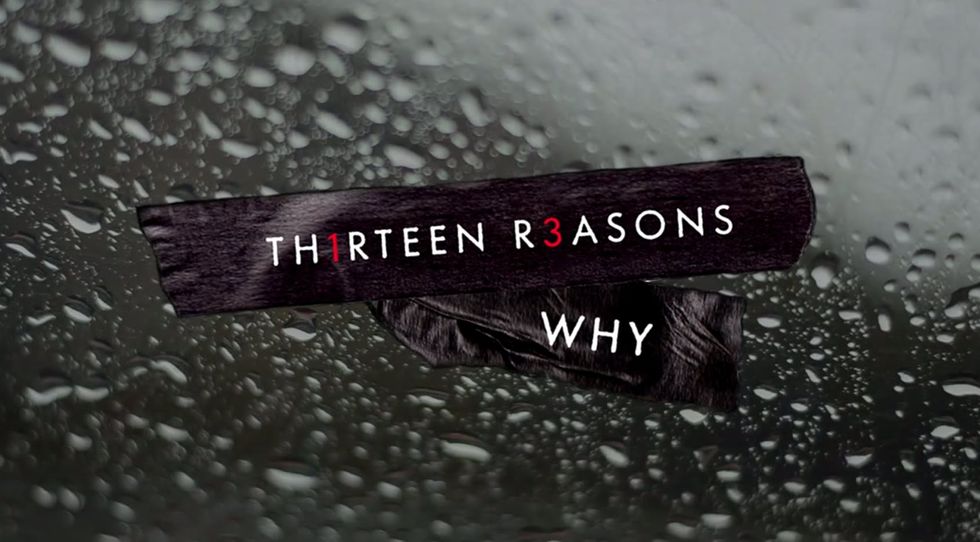Netflix's newest original series, "13 Reasons Why," a television adaption of Jay Asher's 2007 novel "Thirteen Reasons Why," teaches us why. Why we should think before we act. Why we should be observant. Why we should know the signs of depression, mental instability, and suicide.
Both the novel, which I read and wrote a book report on as a 10-year-old, and the television series, which I admittedly spent the majority of last week binge-watching, follow 17-year-old Clay Jensen as he listens to seven audio-cassettes that his friend, Hannah Baker, left before committing suicide. These tapes serve as a suicide letter of sorts, each depicting one of the reasons Hannah chose to kill herself. What's more is that not only does each cassette describe a reason, but each reason is a person; a person who contributed, knowingly or obliviously, to Hannah's decision to slit her wrists and bleed out in a bathtub. Brutal, I know. But this squeamish and gory image gets the message across, doesn't it?
It's a message of violence, cruelty, and ultimately, concern--concern for the life of a fictional character thought up by Jay Asher.
Does the way Hannah died make you cringe? Well, it should. I remember how I cringed as I read the text as a kid, hardly understanding it and struggling to comprehend why someone would do that to his or herself. As a bookworm and bibliophile who read books at the dinner table and rarely took longer than a day or two to read any book of any length, I recall how I struggled with this text, having to stop after every few chapters. Like Clay in both the novel and its television adaptation, Hannah's suicide, and reasoning for it, took me a while to comprehend.
Asher’s young-adult novel was the first book I cried while reading.
What is truly sad is that, as a 19-year-old who now knows an adequate amount about suicide, I did not cry as I watched the show. This has nothing to do with the quality of the show, which is more than commendable. Rather, it has to do with the fact that I am older, wiser, and the show did not surprise me, at nineteen years of age, nearly as much as the text did at ten years of age.
This is because I have since done thorough research on the act of suicide. It is one of those things I will never truly comprehend, but will always strive to. I guess I'm somewhat lucky in that way. I do not suffer from depression, nor have I ever. Because of this, I can never truly put myself in the shoes of someone who has suffered, does suffer, has thought about suicide, or has legitimately committed the act of suicide.
All I can do is try.
As a writer and a journalist, I have tried to understand depression and suicide for years. In 2013, I published an article for my high school newspaper about a boy in my home town, Greenwich, CT, who committed suicide, contemplating if and how it might have been prevented. He, like Asher's fictional character Hannah, was bullied. In this article, I discussed how instead of dwelling on his death, we, as a community, had to learn from it.
In 2016 I wrote a follow-up article for another publication about another boy who committed suicide in Alamo Heights, Texas as a result of cruel bullying. At this point, I was becoming furious with this trend.
According to bullyingstatistics.org, there are about 4,400 suicides reported among teens each year, at least half of which occur as a result of bullying. I could not comprehend this in 2016 any more than I cannot comprehend it now.
To quote myself, "What do we, as individuals, gain from hurting each other? Certainly not more than what we lose. When you hurt another person, perhaps you feel a momentary surge of satisfaction or power. However, I believe that by scarring others with words and actions, the perpetrator is scarred by regret and the inability to change what has already been done."
Again, I cannot pretend to fully understand what goes through the mind's of individuals who decide to take their own lives. However, I do feel that "13 Reason's Why" does a pretty good job of explaining it.
The issue of teen suicide as a result of bullying is just as prevalent today as it was in 2013 and 2016, as depicted by Netflix's newest hit series.
So how do we learn? Or, perhaps the more accurate question is what do we learn? What must we learn?
We must learn to think before we act and before we talk; think about the potential negative affects. We learn to communicate. We must learn to be there for each other. Most importantly, we must learn to watch for the signs and act before it's too late.









































